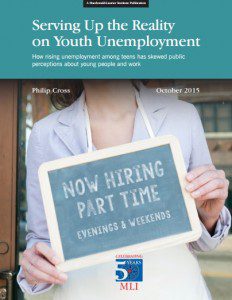 There is no crisis in youth unemployment, writes Macdonald-Laurier Institute Philip Cross in the Financial Post. Our method for measuring is just off.
There is no crisis in youth unemployment, writes Macdonald-Laurier Institute Philip Cross in the Financial Post. Our method for measuring is just off.
This op-ed is based on his recently-released MLI paper “Serving Up The Reality On Youth Unemployment”.
By Philip Cross, Oct. 22, 2015
In the recent federal election campaign, both the NDP and the Liberals made the Harper government’s record on youth employment a major issue, pointing to unemployment rates for 15 to 24 year olds that are double the national average.
However, a closer look suggests the problem is largely confined to teenagers, especially those only 15 years old. For young adults between 20 and 24 years, the chances of getting a job or being unemployed are about the same as before the recession, and equal to their long-term averages. This is important, since it is at this age that youths start making the transition from staying at home and going to school to entering the labour force and living independently; the share in the labour force rises from 50% for teenagers to 77% for young adults, while the share living at home falls from 93% to 59%. Indeed, the peak unemployment rate for this group of 12.2% during the recession year of 2008 was much lower than the highs in previous recessions of 17.8% in 1983 and 15.0% in 1992. By 2014, their unemployment rate had returned to 10.7%, below their average over the past two decades.
It is teenagers who are having more trouble finding a job in recent years, with unemployment lingering near 20% in the aftermath of the recession. Teens never fare as well in the labour market as young adults since they are still maturing physically and acquiring the knowledge and skills employers want. All provinces place major restrictions on the industries and the hours that young teens can work. Moreover, in the 1980s almost all governments removed the lower minimum wage for teens that took account of their lower productivity, out of a mistaken belief that lower wages might violate the Charter of Rights and Freedoms prohibition against discrimination based on age. Another trend that also has raised unemployment among teens is they are more likely to stay in the labour force even while attending school.
“It is teenagers who are having more trouble finding a job in recent years, with unemployment lingering near 20% in the aftermath of the recession.”
Those who decry poor labour market conditions for young people are implying these trends disadvantage all the 2.9 million youths in the labour force, when it mostly affects the one million teenagers between 15 and 19 years. Last year, only 40% of teens 15 years and over had a job, while 70% of young adults were employed. This is an important distinction for social policy, since teens mostly live at home (the share staying with parents edged up to 93%, according to the 2011 Census) and attend school. While getting that first job is important to establish your credentials in the labour market, teen joblessness is not the social crisis of widespread adult unemployment.
 The picture of high unemployment among teens is skewed by the inclusion of 15 year olds in the labour force survey.
The picture of high unemployment among teens is skewed by the inclusion of 15 year olds in the labour force survey.
There was a time when 15 year olds behaved in the labour market like older teens. However, changing social norms has seen a marked drop in the share of 15 year olds who are looking for a job from about 40% to 22%. Of the dwindling number of 15 year olds still looking for a job, markedly fewer are finding one, with unemployment among 15 year olds soaring above 30%. As a result, only 16% of 15 year olds had a job last year, and barely one in five was even bothering to look for one. Rampant unemployment among 15 year olds adds a full point to overall teen unemployment.
Given the very tenuous relationship of 15 year olds to the labour market, Statistics Canada should follow the US Bureau of Labor Statistics and exclude them from the labour force survey (teens in the US are withdrawing from the labour force at an even faster rate than here, partly because job prospects are worse and possibly because higher parental incomes make work unnecessary). There is a precedent for Statcan raising the age of teens covered by the labour force survey, when it dropped 14 year olds from the survey in 1976.
Rampant unemployment among 15 year olds adds a full point to overall teen unemployment.
There is no crisis of youth unemployment, especially for young adults who are transitioning into the labour force at least as well as past generations. For those who cannot get a job, living with their parents provides a better safety net than governments can provide. More broadly, if governments really want to help youths enter the labour force, they should reinstate a separate and lower minimum wage for teens. Instead, provinces are going in the other direction by raising the minimum wage, which will just price more teenagers out of the chance of getting a toehold in the labour market.
Philip Cross is the former Chief Economic Analyst at Statistics Canada and the author of Serving Up the Reality on Youth Unemployment, published today by the Macdonald-Laurier Institute.




